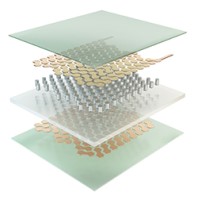EOC offers heat flux sensors that are small, have a high sensitivity, can be easily integrated into the application setups, measure heat flux going into and out of the setup and have a quick response time (under one second). Furthermore, they can determine heat transfer coefficients.
Energy Harvesters – Fast and precise thermal measurements
The gSKIN® Heat Flux Sensor (Product Summary, Selector) helps increase energy efficiency, improve material quality, or add decisive functionalities to your product. Heat flux sensing helps you better understand the thermal characteristics of your materials and processes. The gSKIN® Heat Flux Sensor is applied in thermal measurement and control systems where precision and speed are of high importance.
Advantages of the gSKIN® Heat Flux Sensor:
- Fast Response Time
- Minimal Invasiveness
- Easy to use
- Customizable design
- Robustness
- High Sensitivity
The gSKIN® sensors are used in many applications including:

Core Body Temperature Measurement
The CORE System is a “Disruptive Technology:”
- Ideal for COVID-19 related symptoms monitoring
- Easy to use & Reliable
- CORE enables 24/7 Elevated Body Temperature monitoring
- Highest accuracy on the market and in changing ambient conditions
gSKIN® Heat Flux sensors, small sensors with high sensitivity, are easily integrated into a variety of core body measurement applications. The gSKIN® Heat Flux sensors are non-invasive and provide a fast measurement of the core body temperature. Core body applications include monitoring athletic performance, medical applications and people exposed to high temperature environment (firefighters, etc.).

General Heat Flux Measurement
Understanding the thermal environment is of great importance. For example, gSKIN® sensors can support you with understanding the thermal influences affecting the setup (e.g. heat deforming sample holders), or reviewing the thermal output of processes (e.g. heat output from a chemical reaction). Although in many applications temperature sensors are sufficient in establishing an accurate understanding of the thermal environment, in some cases a deeper insight into the thermal processes is required. Heat flux measurements can provide the needed data.
gSKIN® Application Notes:
Value Measurements with greenTEG’s U-Value Kit
Why Temperature Feels Different Depending on the Material
gO Measurement System
The gO Measurement-System is a cloud-based, wireless system for U-value, R-value, surface temperature, and humidity measurements. It allows for simultaneous measurements with up to 16 sensors and real-time remote monitoring. It is the only system on the market which gives you hard data about the insulation quality of building elements. The gO Measurement-System is especially designed for applications in building physics.
Advantages
- Easy to set-up and use
- Real-time and remote monitoring via cloud
- Simultaneous measurements with up to 16 sensor nodes
gO Measurement System for Robust and Weather-proof Cloud-based Measurement
gO Application Notes:
gO Measurement System
gO Measurement System U-Value Calculator
U-value Measurement/ Building Physics
In the field of building physics, U-value is the term used to describe the heat transfer coefficient of a building element (e.g. of a wall). The U-Value describes the insulation quality of a building. The unit is W/(m²K). The smaller the U-Value, the better the insulation quality of the building element. greenTEG’s measurement-approach uses a Heat Flux Sensor and two temperature sensors. This approach is standardized in ISO 9869, ASTM C1046 and ASTM C1155. This is the only method which delivers reliable quantitative in-situ information about a building envelope. Please find more details on greenTEG’s U-value website.
- U-Value and Building physics
- U-Value Measurements on a refrigerator
- U-Value Measurements on Windows
- U-Value Measurements in Occupied Buildings
- U-Value: Measurement vs Calculation
- U-Values of Building Envelopes
- U-Value Measurement Building
- U-Value and R-Value Compared
- gSKIN U-Value Kit
Battery calorimetry
Batteries produce heat during the charging and discharging phases. Knowing the amount of this heat is of great importance for battery safety, research, and control. That is why calorimetric measurements on batteries are common. However, standard battery calorimeters are expensive and the experiments are time consuming. With greenTEG’s Heat Flux Sensors, calorimetric measurements become affordable and feasible for any system and application.
- Calorimetric measurements on batteries
- Battery Cycling, gSKIN® Heat Flux Sensor Measures Thermal Footprint
Phase-Change-Materials (PCM)
Heat flux is important to measure for the understanding and optimization of PCMs and other thermal storage materials. Nowadays, PCMs are efficiently characterized through the powerful method of Differential Scanning Calorimetry (DSC). However, the characteristics of the PCM itself in the specific application can be different. For optimal integration, in the application the characteristics need to be known. With greenTEG’s Heat Flux Sensors, calorimetric measurements directly at the application become feasible.
Other Application areas
Other application areas are: Textile, Core Body Temperature, Precise Instrumentation, Solar Measurement, Calorimetry, Mass Flow, Fouling Detection.
- Calorimetric Measurements
- Solar Measurements
- Heat Transfer Coefficient of Fabric
- Heat transfer for Roll to Roll Drying Processes
- Heat Flow Measure Measurement of Special Insulation
- Measurement of Effectiveness of Thermal Diodes
- Textile Thermal Properties Measurement
- Heat Flux Sensors for OEM Applications
